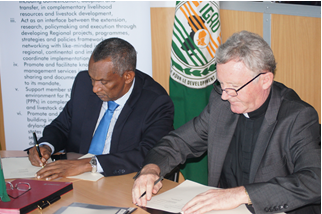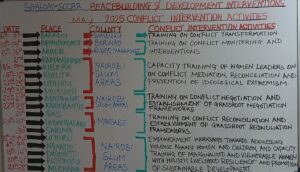(https://shalomconflictcenter.org/2009-2023-shalom-sccrr-results-and-achievements/; https://shalomconflictcenter.org/3901-2/;https://shalomconflictcenter.org/wpcontent/uploads/2024/01/Harvard_Kennedy_School_ArticleWITH_PHOTOS_MAP_1_17_24_FINAL.pdf;&https://shalomconflictcenter.org/wp-content/uploads/2024/02/Shalom-SCCRR-Who-We-Are-2023-2024.pdf)
Introduction
June 2015 marked an important milestone in the history of Shalom-SCCRR as the organization renewed the Memorandum of Understanding (MoU) earlier signed with the Intergovernmental Agency for Development (IGAD), which is comprised of eight nations in Africa: Djibouti, Ethiopia, Eritrea, Kenya, Sudan, Somalia, South Sudan, and Uganda. The people in these states often face tremendous stresses in terms of violent conflict, hazardous social progress, and underdevelopment.
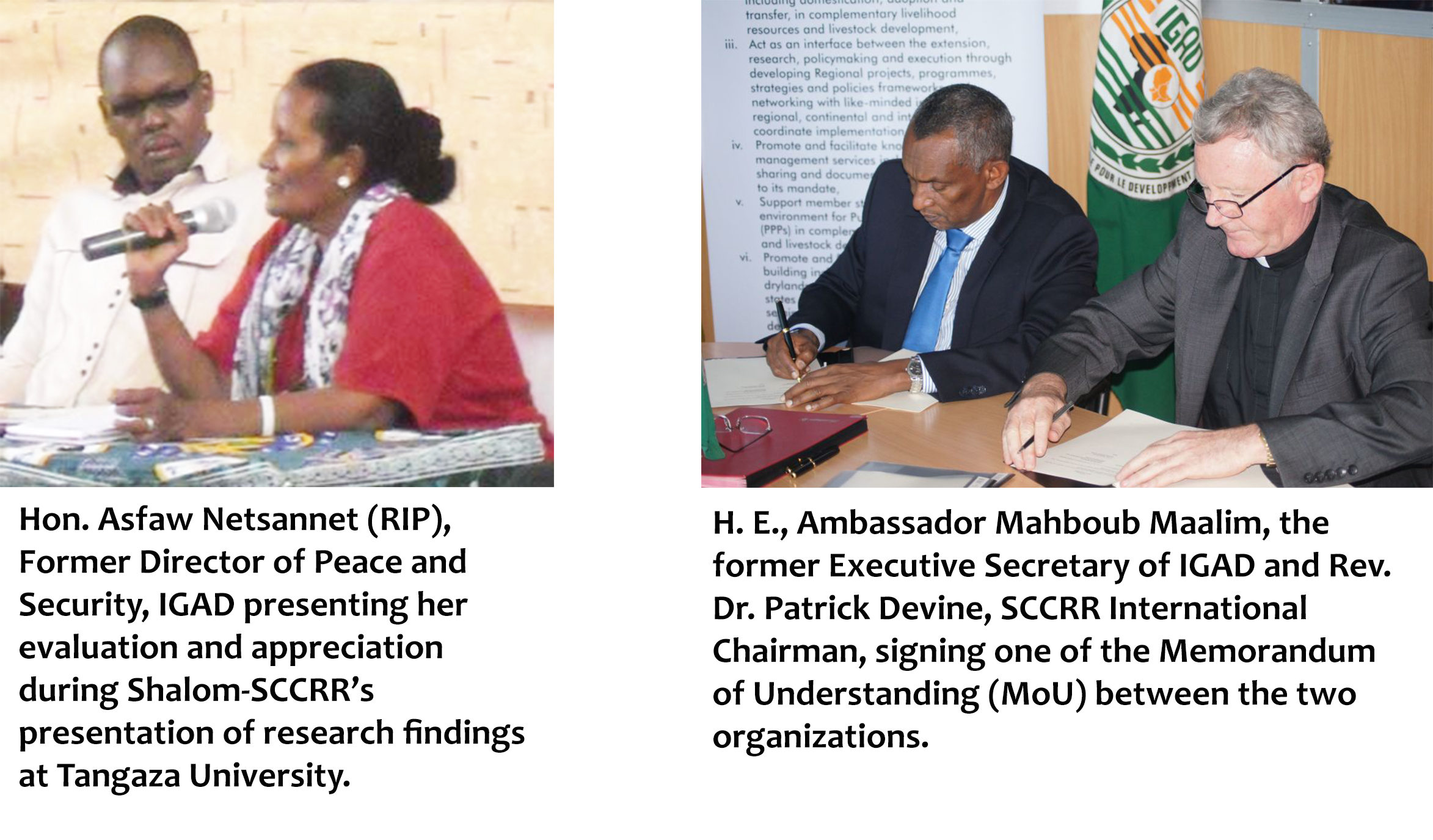


In this regard and in recognition of the expertise of the two organizations, an enhanced collaborative approach was reached in order to galvanize the energies of each towards effectively addressing challenges associated with Peace and Security, Environment, Extremism, Gender, and Economic Development in the region.
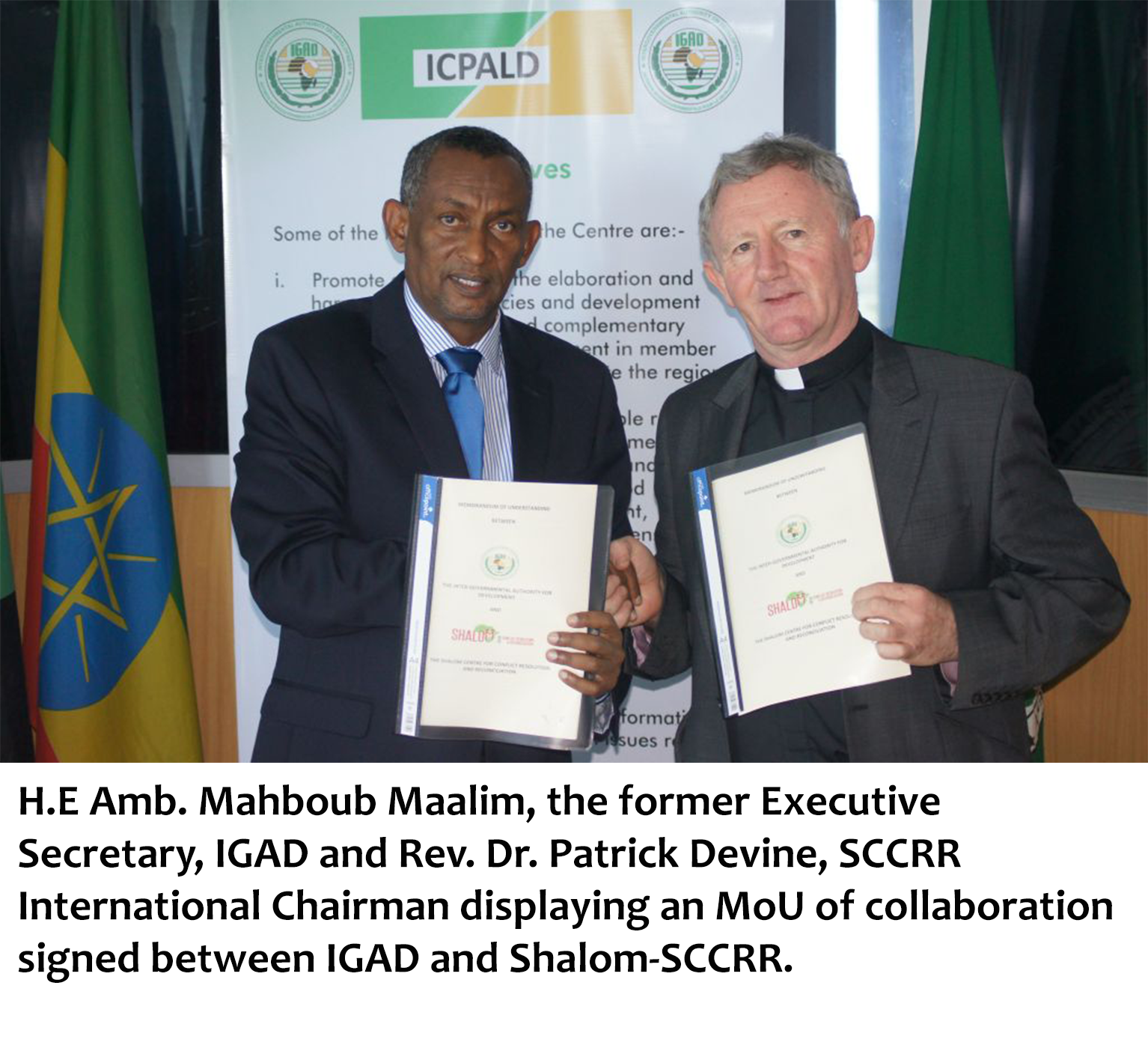

While endorsing Shalom-SCCRR to the United Nations (UN) in 2018, IGAD observed that;
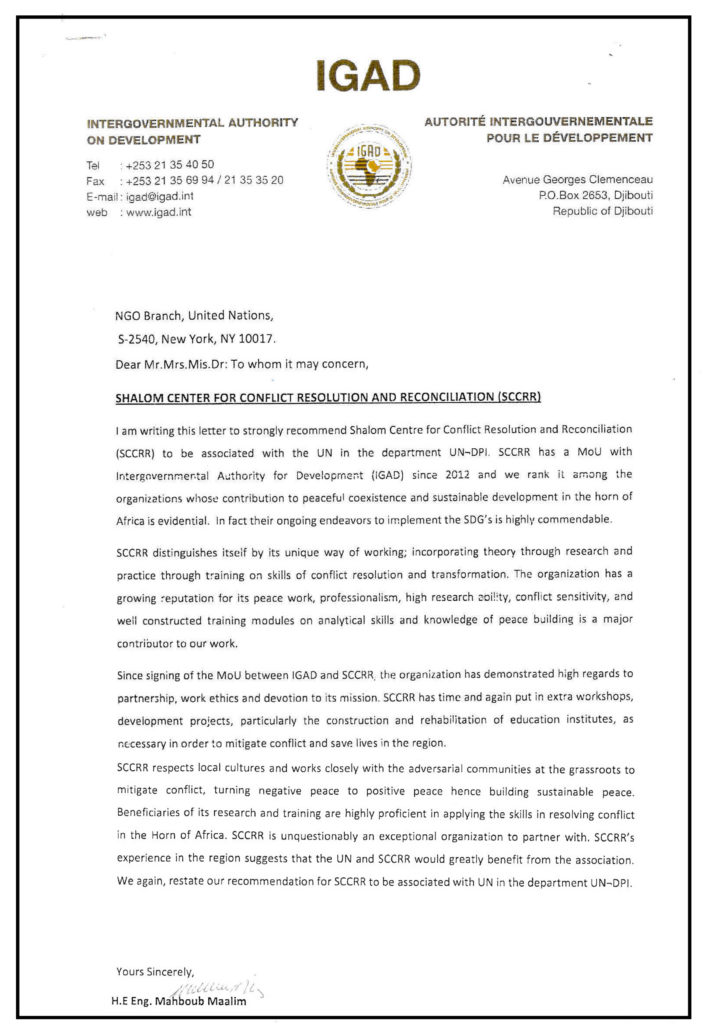
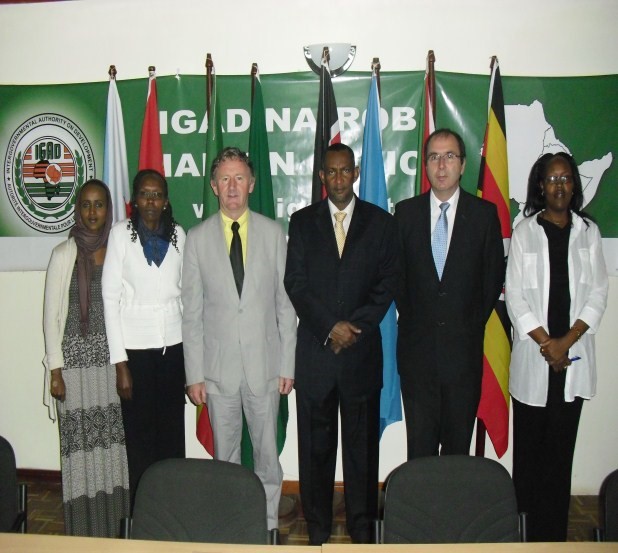
In 2013, Shalom-SCCRR’s founder Fr. Patrick Devine, PhD was awarded the prestigious International Caring Award, succeeding the Dalai Lama, and was later inducted into the Caring Hall of Fame located at the Fredrick Douglas Museum in Washington D.C. This accolade is an indication of the credibility of Shalom’s work and a global affirmation of the massive support that the organization continues to give to the global efforts towards peace and sustainable development especially among the vulnerable of our society.
Since then, the MoU has enabled the collective realization of a number of milestones as illustrated through the thematic areas below. (https://shalomconflictcenter.org/wp-content/uploads/2024/05/14-Years-of-Shalom-SCCRR-2009-2023-LV-Full-Report.pdf)
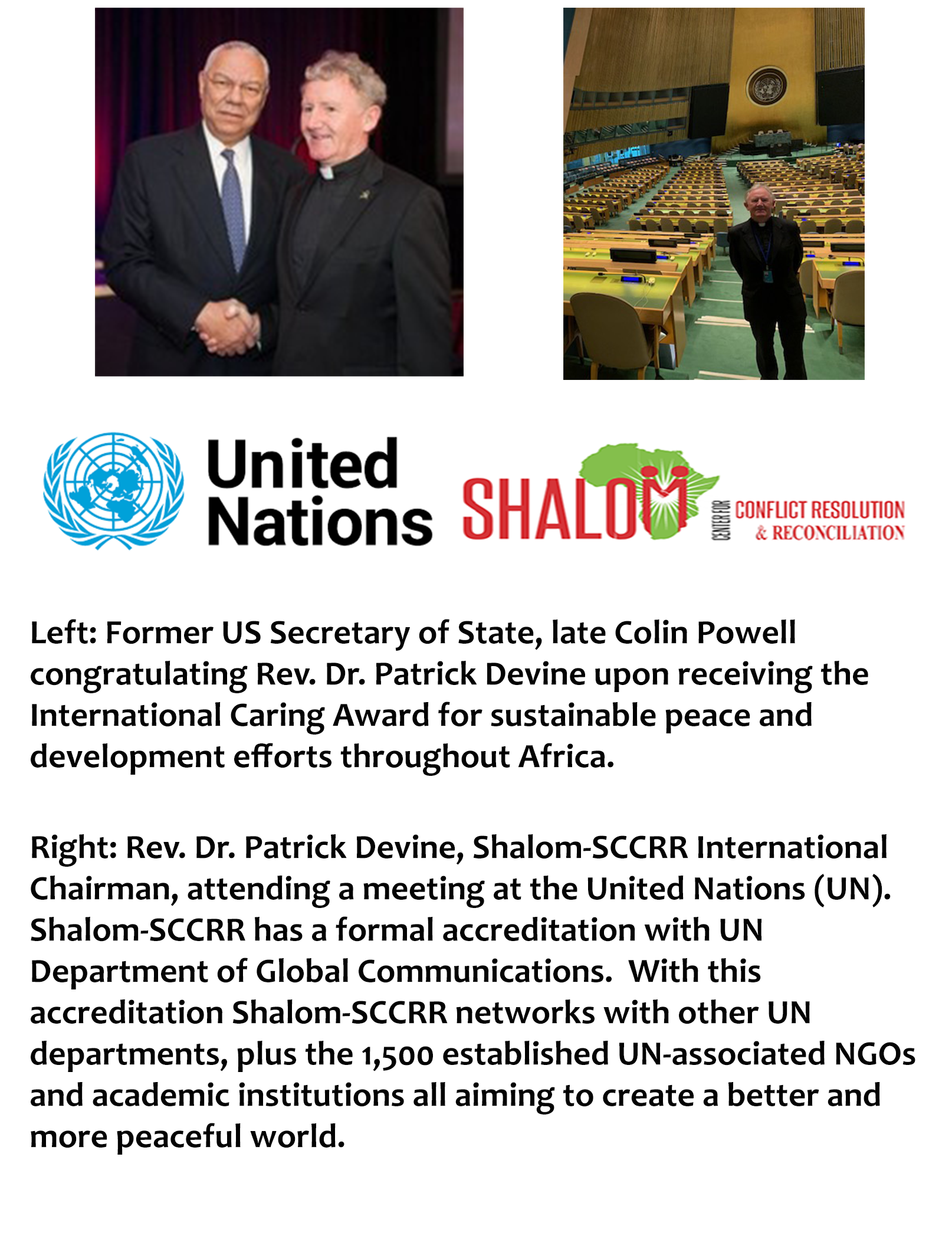
Dissemination of Research Materials
SHALOM-SCCRR’s peacebuilding methodology has been firmly anchored on research into the underlying causes of conflict. The organization’s guiding principle in this regard is that “conflict transformation and peacebuilding work cannot bear the desired impact without having credible and verifiable data/information about the conflict environment to be transformed (https://shalomconflictcenter.org/wp-content/uploads/2024/01/Harvard_Kennedy_School_Article_WITH_PHOTOS_MAP_1_17_24_FINAL.pdf).
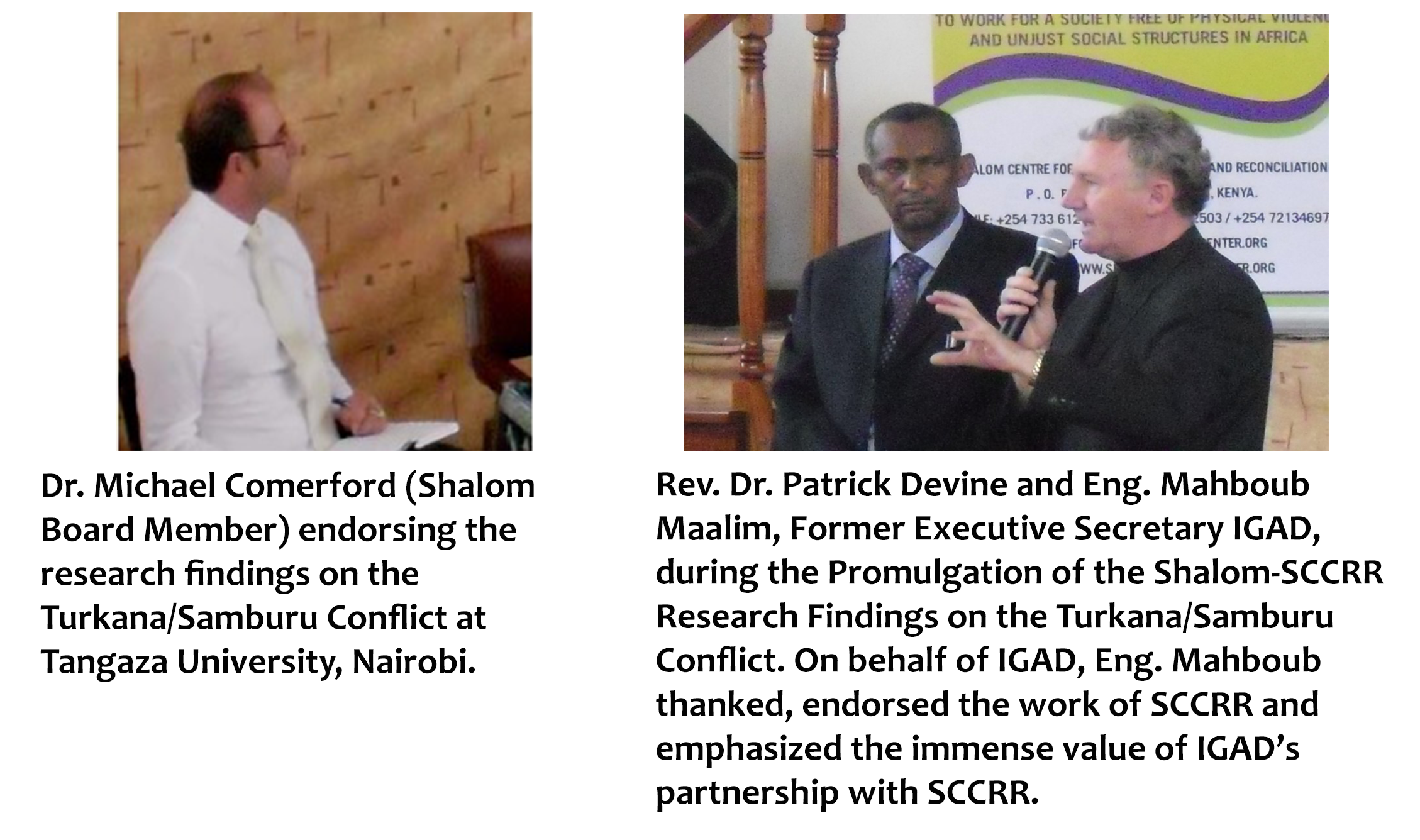

https://shalomconflictcenter.org/wp-content/uploads/2021/10/CONFLICT-BETWEEN-PASTORAL-COMMUNITIES-IN-EASTERN-AFRICA-SCCRR-RESEARCH-FINDINGS-ON-THE-TURKANASAMBURU-CONFLICT-TANGAZA-COLLAGE-MARCH-312012.pdf
The SHALOM-SCCRR Research Department in conjunction with the Monitoring, Evaluation, Reporting and Learning team (M.E.R.L) is vigilant in focusing on the root causes of conflict and analyzing progress, trends, lessons learned, and emerging variables. The organization has conducted research on the underlying root causes of conflicts across 21 communities engaged in inter-communal conflict in the IGAD region. This is inclusive of the research on the underlying causes of the Turkana-Samburu conflict whose findings were presented in Tangaza University College through a well-attended public lecture that also recorded the participation of IGAD. Research has provided factual information about conflict dynamics which has made it possible for Shalom-SCCRR to make its knowledge available to different organizations all over the IGAD region. The continuing enthusiastic and voluntary participation of government, religious and civic society organizations in Shalom-SCCRR symposiums, research collection methodology, conflict transformation and peace training programmes, advocacy on peace-truth-justice-mercy issues (reconciliation), inter-religious Dia-Praxis initiatives, fostering of inter-ethnic and inter-religious education, institutional developments, confirms the importance of our organization’s contribution.
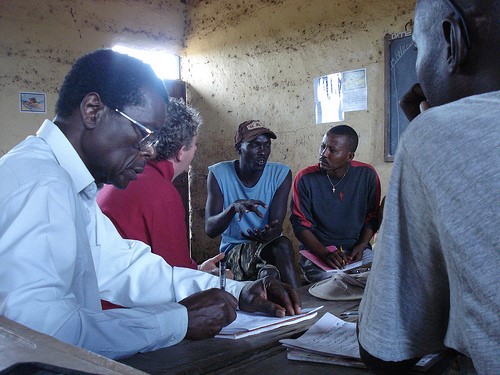
Prof. Wanakayi K. Omoka, Shalom-SCCRR Director of Research and Rev. Dr. Patrick Devine, International Chairman, engaging with some key stakeholders at a Focus Group Discussion on human rights issues in the multi-ethnic conflict prone Ilemi Triangle region. The data was a useful guide for SCCRR in developing a proposal for conflict transformation around the building of the Sahel Great Green wall.

Shalom project and research team presenting their perspectives on climate change and conflict in the horn of Africa with Mr. Don Mullan, UNCCD to enlighten the Great Green Wall project team on conflict mitigation approaches that the project should adopt accross the Sahel region.https://shalomconflictcenter.org/building-the-sahel-great-green-wall-in-the-face-of-localized-cross-border-conflict-how-shalom-sccrrs-peacebuilding-methodology-can-bear-on-theconflict/
In order to keep on updating the existing stock of knowledge in regard to the changing trends of conflicts, and, adjusting its intervention strategies in program areas, Shalom-SCCRR is continuously conducting longitudinal research on the various dimensions of conflicts that manifest in the IGAD region. As a result, the organization has generated 11 briefing papers depicting the disaggregation of Shalom-SCCRR’s peacebuilding and development interventions in the cycles of inter-communal and inter-group conflicts in rural hinterlands and urban areas found within the IGAD region.
Peace and Security
The field of peacebuilding has increasingly emphasized the centrality of relations between parties and processes to capture the complex interconnectedness that shapes the peacebuilding milieu. Community participation has undoubtedly become a key pillar in the continued sustainability of peace dividends and the sharing of information that may be critical for preventive action. Moreover, constant community participation has enabled the improvement of community ownership of peacebuilding processes and strengthened the structural architecture towards effective locally-driven peacebuilding. The sensitive nature of conflict, however, continues to call for the necessity of verifiable data as crucial support to the community’s agility in seeking solutions to conflict issues that affect locally.
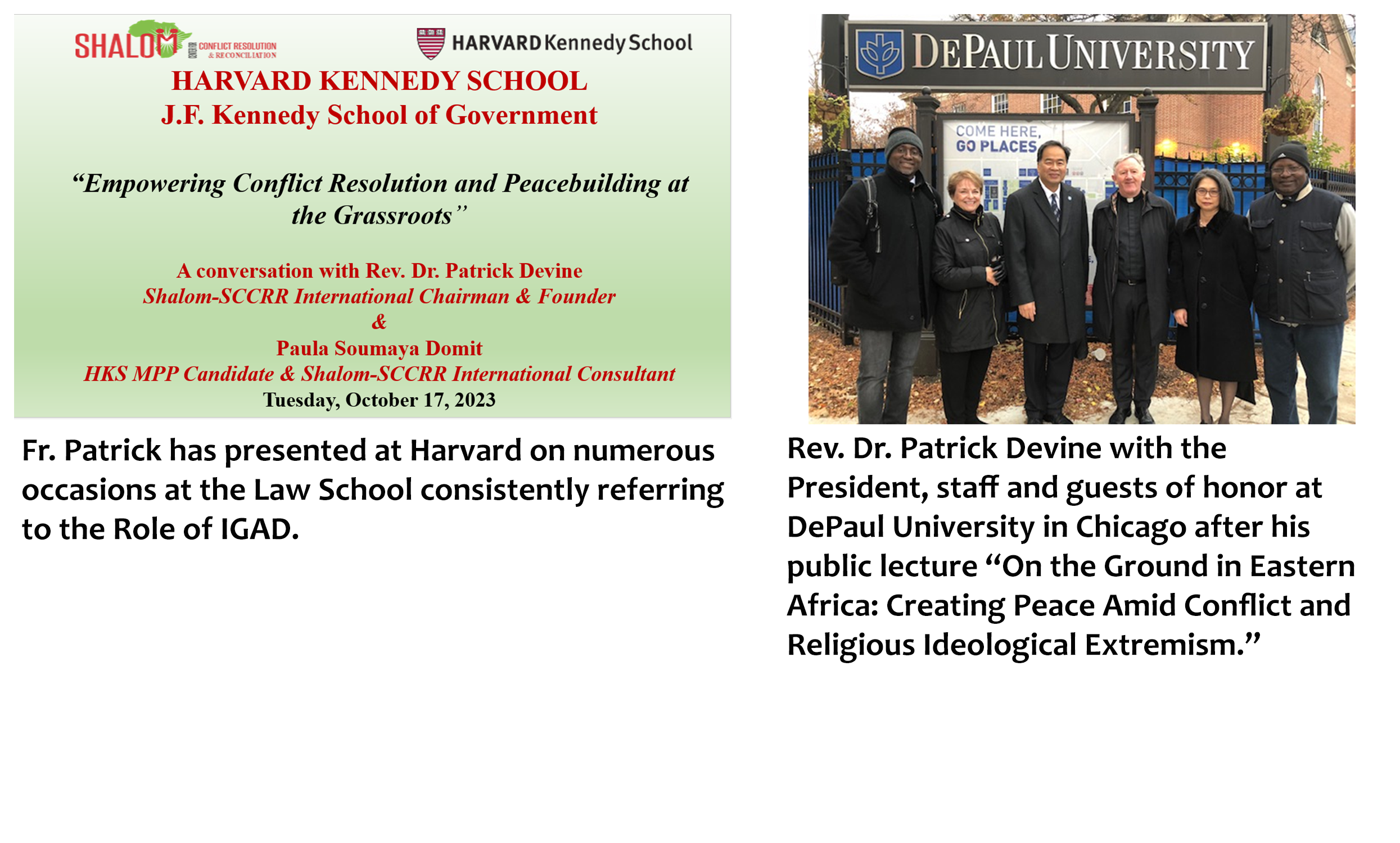
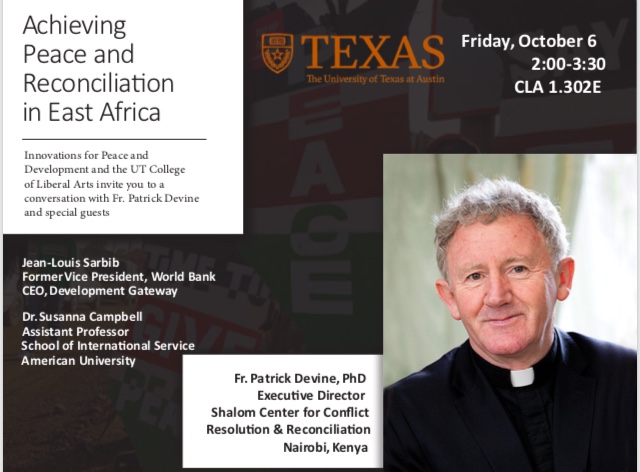
Over the years, Shalom-SCCRR through its International Chairman has received numerous nominations, awards, and receptions to speak to the world about the dire situations that conflicts have subjected the world into and the transformative change that Shalom-SCCRR methodology is bringing to such societies.
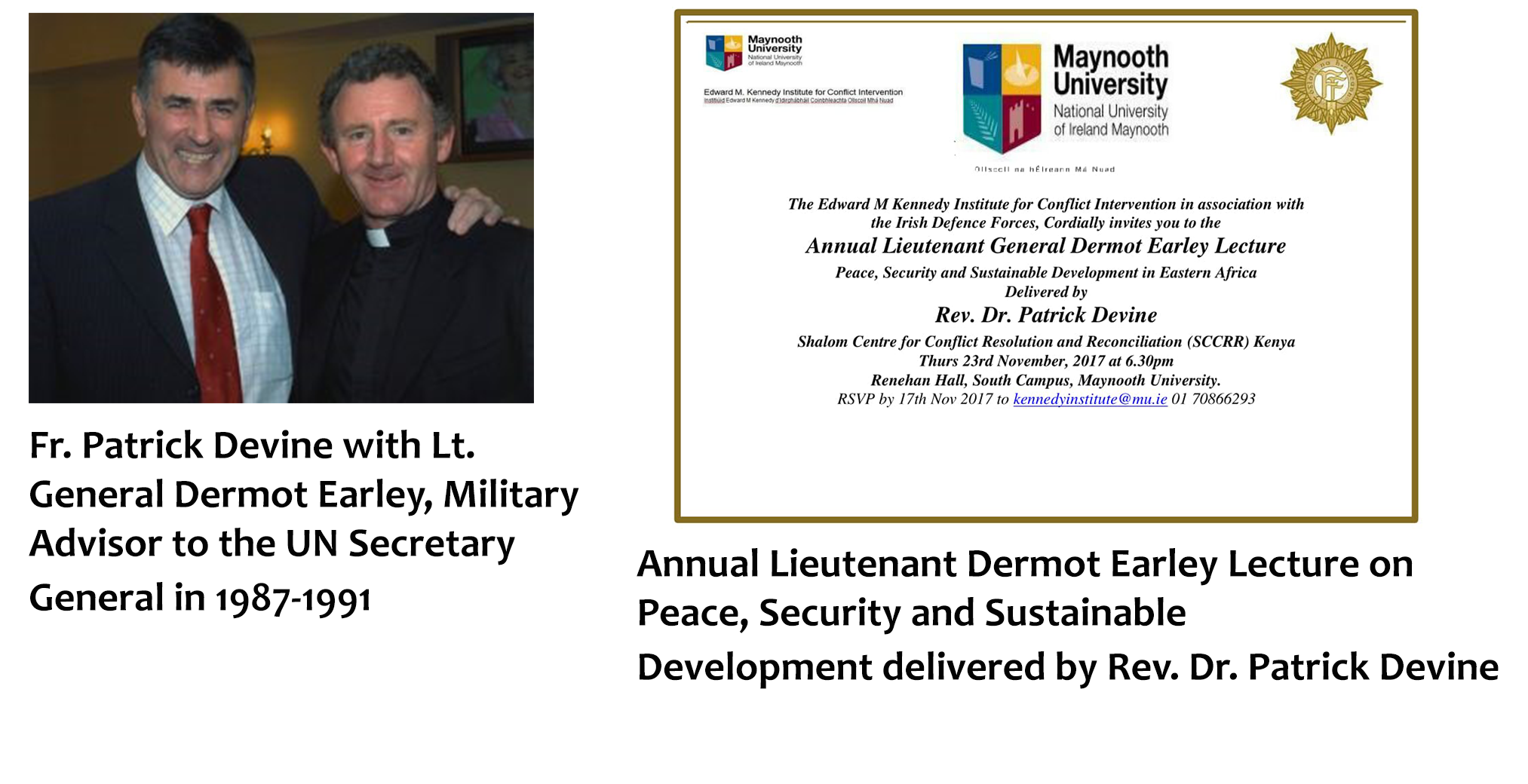
At the heart of the Shalom-SCCRR specialized modus operandi are collaboration and the empowerment of local communities in conflict to be analyzers, owners and architects of their own interdependent future of peaceful co-existence. In sharp contrast to the diagnostic solutions prescribed from the top down, Shalom-SCCRR has boosted positive results in peacebuilding through its adoption of the grassroots approach which fundamentally supports the local communities to be the initiators of the change that they want to see. A case example is the once volatile borderline between the Luo and the Nandi communities in Western Kenya. In 2017 there was widespread manifest violence along the Kisumu-Nandi borderline. Shalom-SCCRR trainers equipped its Peace Groups in these conflict environments with necessary skills to identify election-related conflict risks and to apply proactive conflict prevention interventions, school/educational development and joint community development initiatives as a way of entrenching the culture of tolerance and joint thinking towards development. As a result, the 2022 elections passed without any violence in the area and Shalom-SCCRR received widespread acclaim for this success from the local influential opinion shapers and administrators. The Area remains peaceful to date and Shalom established community leaders across the ethnic divide continue upholding high level collaboration in protecting the peace.

Shalom has been a pillar of IGAD’s peace and security agenda over the past 14 years by empowering 28,397 influential stakeholders and grassroots peace actors with analytical skills and techniques for Conflict Transformation and Peacebuilding through 990 Training Workshops in 36 Conflict Environments in Kenya, and at the Kenya-Ethiopia-South Sudan-Uganda interface. The training workshops and the resultant problem-solving initiatives have aided the reduction of inter-ethnic-based violent conflict incidents by an average of 67% in Shalom-SCCRR-engaged project areas; a clear fulfillment of the intention of the MoU to transform and complement ongoing peace processes in the region.
Furthermore, Shalom’s intervention has led to improved peace and security by 58% in areas where Shalom-SCCRR is intervening based on our monthly conflict incidents tracking. This has created a supportive environment for the development of the local economy, stable and safe human settlements, health centers, and other social facilities. In addition, Shalom-SCCRR has developed internationally acclaimed and implemented modules addressing religious ideological extremism, and violence against women and children key among them being Human Trafficking. (https://shalomconflictcenter.org/wp-content/uploads/2021/02/Radicalisation-and-Extremism-in-Eastern-Africa-Dynamics-and-Drivers.pdf)
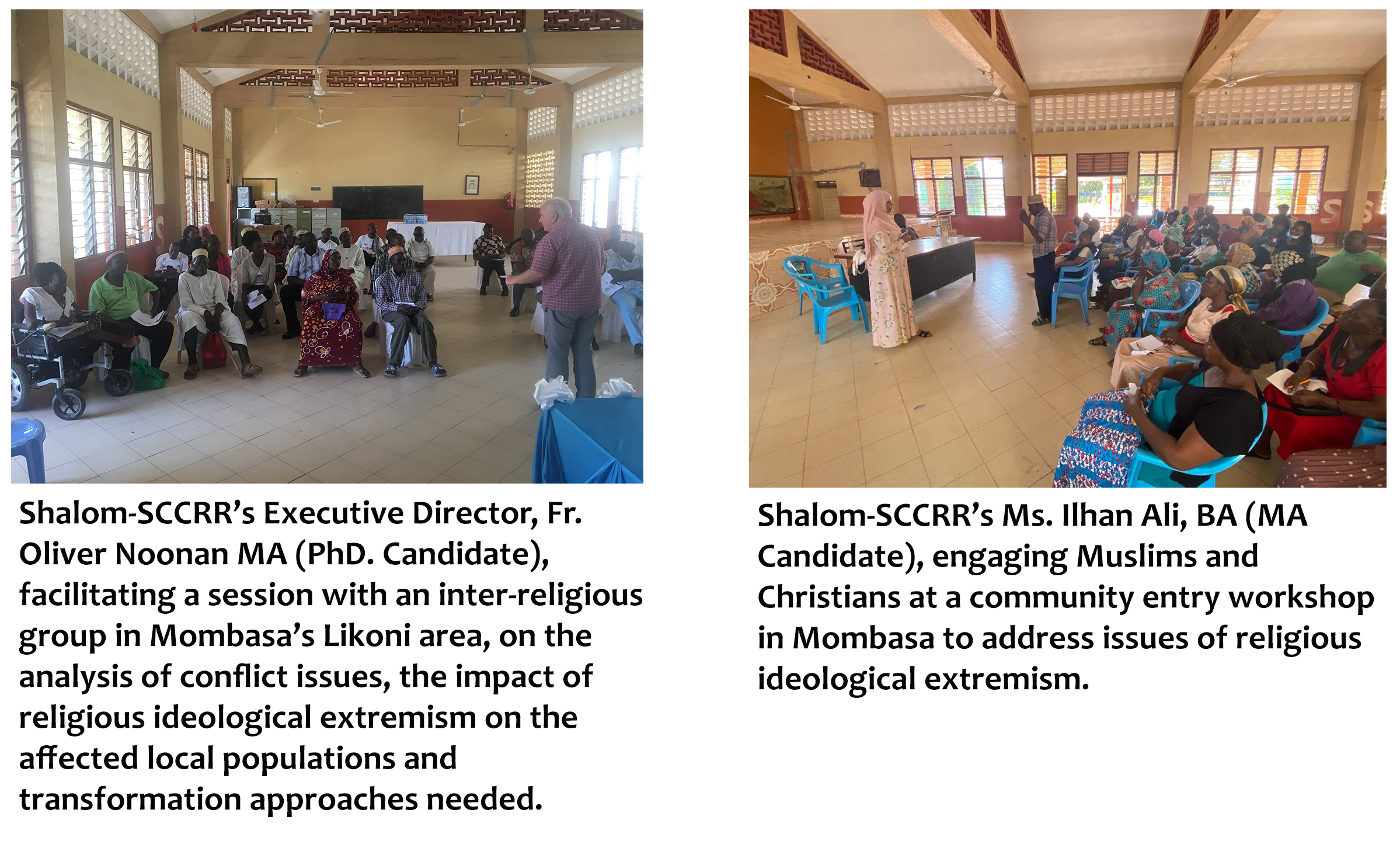
Further still, Shalom has in the recent past taken up a critical intervention in the troubled borderline between Elgeyo Marakwet and Baringo counties in Kenya where persistent inter-ethnic violence between the Marakwet, Pokot and the Tugen communities have caused massive destruction for ages. As far as Eastern Africa is concerned, Shalom-SCCRR is expanding its interventions on conflict transformation skills and peacebuilding techniques to the conflict-ridden Democratic Republic of Congo (DRC). With the country becoming a full member of the EAC on 11 July 2022 following the Treaty on 8 April 2022, the time is ripe for Shalom-SCCRR to support the conflict transformation in this country that has experienced protracted violent conflict for long (https://shalomconflictcenter.org/democratic-republic-of-the-congo-drc-shalom-center-for-conflict-resolution-and-reconciliation-sccrr-outreach-intervention-for-peace-a-dream-that-is-becoming-true/).
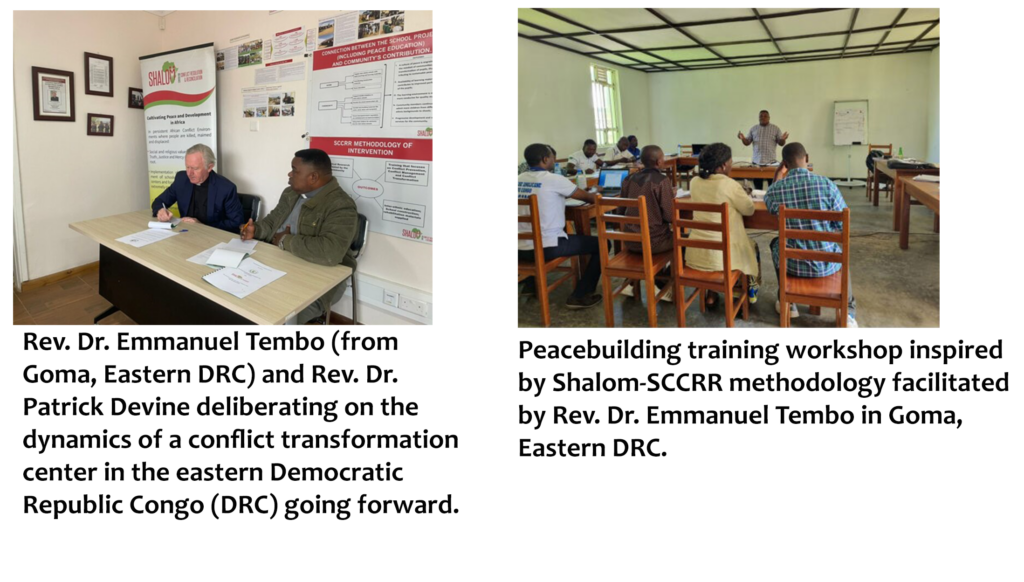
Supporting Local CEWARN Mechanisms
Through its intervention methodology, Shalom-SCCRR has prioritized the capacity building of local influential opinion shapers who through working with structured local institutional frameworks have become resourceful in ensuring the availability of accurate data that informs the peacebuilding interventions adopted locally.
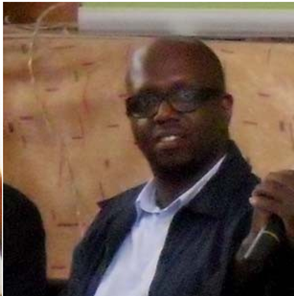
In a bid to support IGAD’s CEWARN mechanisms, Shalom-SCCRR has established in every conflict environment a locally coordinated group of highly influential and committed local community resource persons who, courtesy of their skills acquired through training, have provided the human resources needed to facilitate peacebuilding action plans both within the community and with other ethnic communities. The structured institution collects, verifies, and relays real-time data on latent and overt conflict incidences to Shalom-SCCRR’s Monitoring, Evaluation, and Research team. After meticulously processing and professionally analyzing the data, this team produces conflict status reports which are then disseminated back to the community leaders to inform their timely activation of immediate, intermediate, and long-term conflict intervention initiatives.
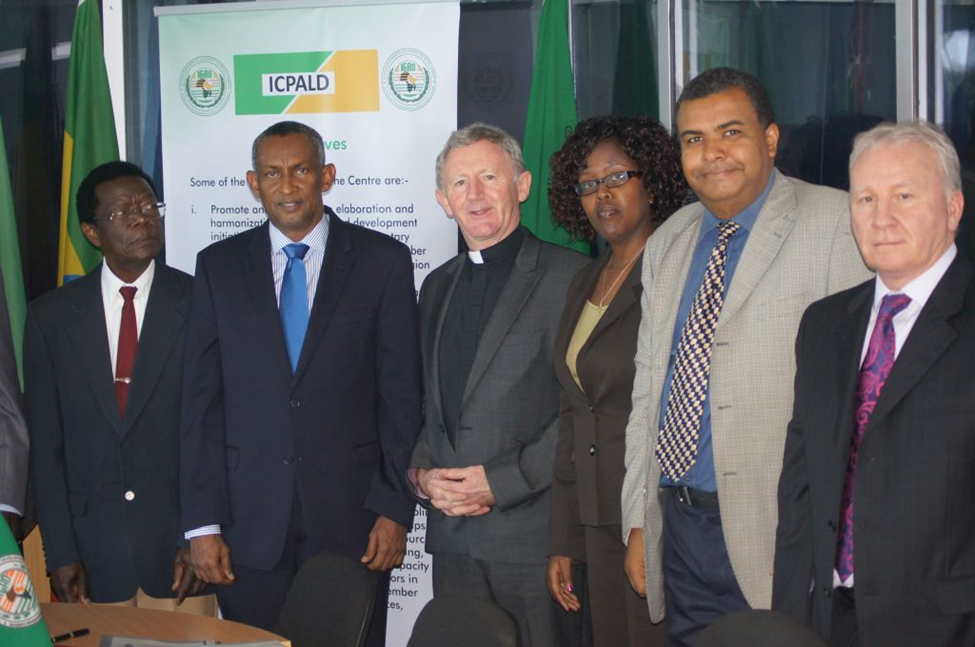
In each of the 36 conflict environments where Shalom-SCCRR has been working across the IGAD region, a locally managed conflict monitoring and response group/institution has been established. Out of the 28,397 influential stakeholders and grassroots peace actors who have been empowered with analytical skills and techniques for Conflict Transformation and Peacebuilding, there are a total of 105 well-trained and certified Community Resource People (CRPs) who by virtue of being resident members of the communities that they serve have become quite dependable in operationalizing Conflict Early Warning and Response through data collection, analysis and community action informed by the verified conflict incidence data. Through close guidance by Shalom’s professional project team, the resource people have developed a strong capacity to handle conflict-sensitive data and use it appropriately to inform their decision-making on the choice of conflict intervention techniques that suit a situation.
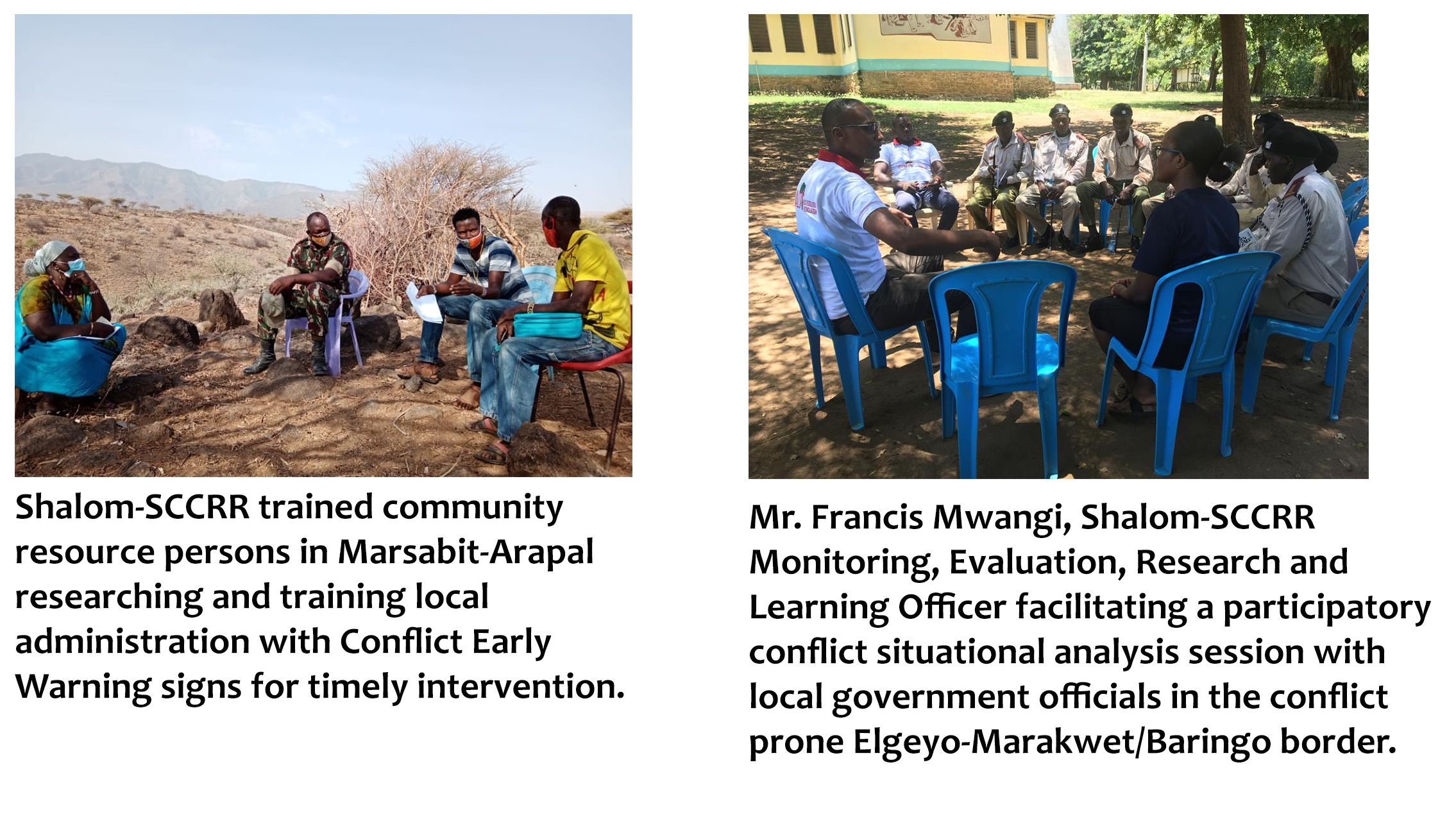
This functional structure has significantly boosted timely response to conflict, thus helping prevent disputes that would have otherwise turned fatal. Operational and effective locally developed and sustained Conflict Early Warning and Response Mechanisms have aided the prevention of more than 60% of looming conflicts while also improving the frequency of interethnic interactions. The conflicting communities have since adopted a regular meeting system to familiarize themselves with the conflict situation as well as the state of peace thus ensuring maximum local initiative towards conflict prevention.
The collective action achieved through Shalom’s established community leadership has enabled the ease of stakeholder coordination on security-related matters between the community and key duty bearers in the security sector.
Economic Cooperation

https://shalomconflictcenter.org/eu-development-council-we-cant-have-sustainable-development-without-peace/
In an effort to facilitate quality education for all, Shalom-SCCRR has continued to make a major contribution to ensuring inclusive and equitable quality education and the promotion of lifelong opportunities for all. In so doing, Shalom provides a wide range of life-giving productive alternatives to individuals as well as realizing sustainable development for communities. Shalom continues to be actively on the ground complementing the commitments of IGAD member states to provide quality education following the prescription of UN SDGs. Shalom has been vigorously assisting the people in Eastern Africa to advance infrastructure development in the process of settling and resolving inter-ethnic conflicts. Part of this demanding task has been attending to what seems to be historical marginalization that dates back to colonial times which negatively impacts the achievement of quality education in the IGAD region, particularly in the intersection between Kenya, South Sudan, Uganda, Ethiopia, and Somalia borders where Shalom has been actively involved in implementing development projects.
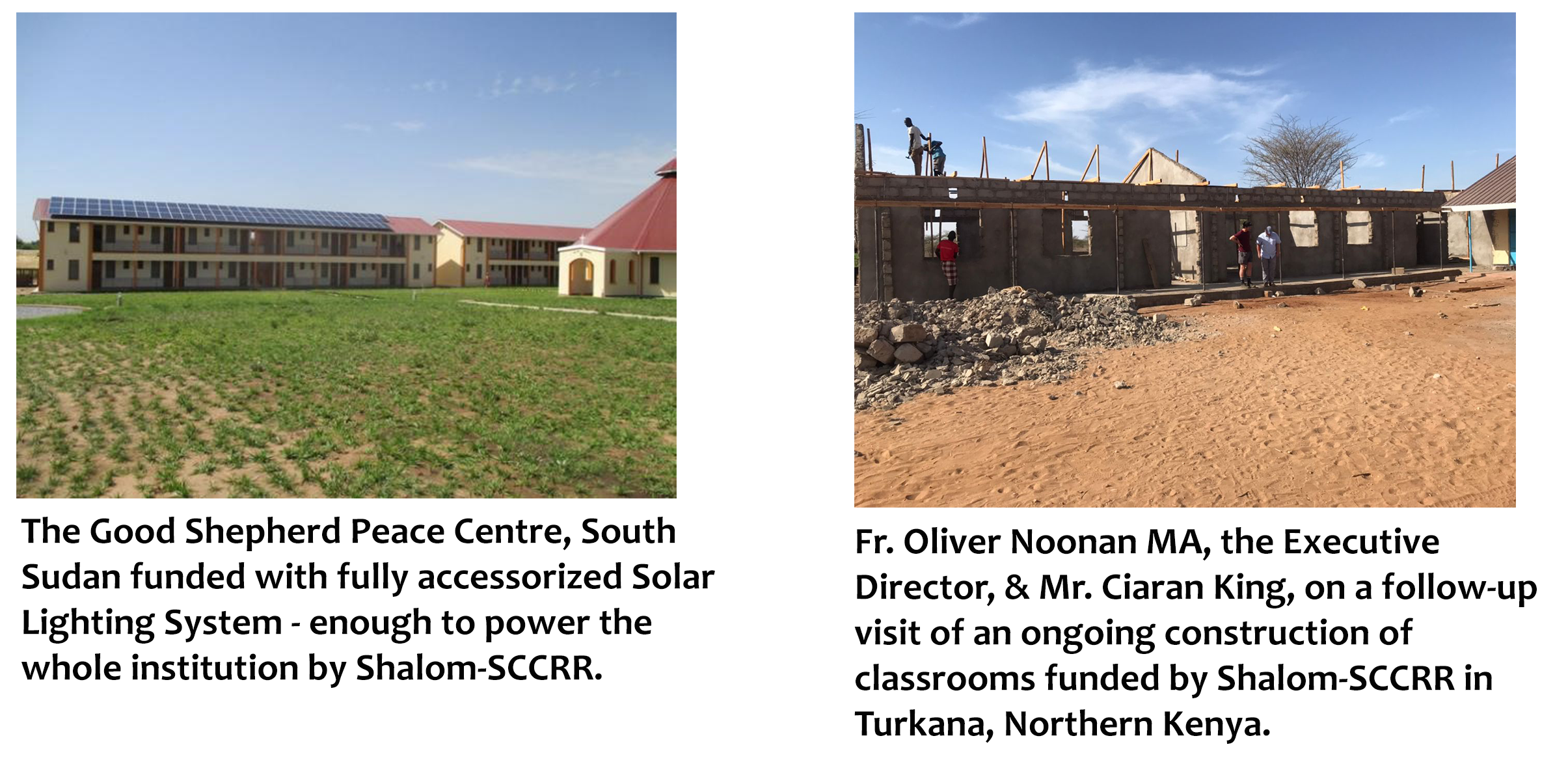
Through institutional development programs, Shalom has in the past 14 years completed 671 School/Educational Development Projects which include the construction of classrooms & boarding facilities, solar lighting, provision of sanitary items for girls, books, desks, and water among others. Through these projects, 370 Schools/Educational institutions in marginalized conflict environments within Kenya, Sudan, South Sudan, Ethiopia, and Tanzania have benefitted. This has impacted a direct beneficiary population of 207,086 pupils and students (100,178 [48.4%] Girls; 106,908 [51.6%] Boys). Furthermore, 3 Pastoralist/Shepherd schools have benefitted from Shalom’s development support in recognition of the plight of the youth who are at risk of missing out on formal education/schooling. Finally, 1 University and 3 Vocational/Tertiary institutions have been provided with educational materials in Kenya and South Sudan as a way of promoting access to quality education for the young generation who are facing various vulnerabilities, violent conflict included.

Shalom-SCCRR has achieved real and profound results in transforming the lives of poverty-stricken tribes in the conflict environments within IGAD region and the organization is still in the process of further upping the momentum.
Gender
In most areas where we have activated peacebuilding and development interventions, women and youth are underrepresented in decision-making and leadership roles. Focusing on the way of life of the majority pastoralist communities living in the IGAD region, women and youth are largely cut off from the social, cultural, and economic infrastructures due to the dominance of patriarchy. Recognizing those limitations, Shalom-SCCRR has continued to engage more women and youth in conflict transformation, peacebuilding and development leadership roles. Up until 2023, Shalom-SCCRR has achieved 60% Women engagement in Conflict Transformation, Peacebuilding and Livelihood programs (a 58% increase from the 2% participation that the organization recorded in 2009 when we launched). This has enhanced collaboration between women and men in implementing conflict transformation activities thus promoting the inclusive participation of both genders in local problem-solving initiatives.

In response to violent situations in the urban settlements especially in Nairobi, Shalom-SCCRR opened a center whose aim is to transform the lives of vulnerable and marginalized women and children in the extremely poor urban informal settlements where violence against women and children remain a complex social problem. Shalom has contributed to the reduction of gender discrimination by initiating women’s empowerment through Shalom Empowerment Center (SEC) and Mary and Joseph Life Center (MJLC) (https://maryandjosephlifecenter.org).
Shalom’s SEC and MJLC have contributed to the accomplishment of the SCCRR-IGAD MoU by empowering women residents from 10 Urban Informal Settlements/Slums, as well as those from the marginalized conflict environments in the semi-arid terrains where Kenya interfaces with Ethiopia, South Sudan and Uganda. Through the MJLC and SEC, 2,239 Women living in acute conflict situations/Slums, have been empowered with analytical skills and Peacebuilding techniques through 86 Training Workshops on Conflict Transformation and Reconciliation. Additionally, 1,873 Women have been empowered with Holistic Livelihood Resilience Capacity, Life skills, and other relevant courses and interventions essential for resolving all forms of manifest and structural violence.

Exposure to various forms of harm and living in fear prevents women from fully realizing their potential, reducing their well-being, and also reducing their contribution to the development of society. Like most urban slums in the world, women and children in Nairobi’s slums suffer a number of challenges, including fewer educational and economic opportunities, limited access to reproductive health services, poor representation in decision-making, and high rates of violence.

Human and Organ Trafficking: Why Shalom-SCCRR Intervenes and Responds!
The Shalom Center for Conflict Resolution and Reconciliation (SCCRR) is a non-sectarian inter-religious conflict transformation and peacebuilding non-governmental organization founded in Africa. Its vision is a society where peace, justice, and reconciliation prevail throughout the continent (https://shalomconflictcenter.org/ ). Its main objective is to attain conflict resolution for all people in Africa through empowering local communities engaged in inter-ethnic conflict, religious ideological extremism, and violence against women and children to be the architects of their own interdependent future of reconciled coexistence (https://shalomconflictcenter.org/shalom-sccrrs-conflict-transformation-and-peacebuilding-intervention-methodology-and-processes-synopsis/). Human rights and positive peace are mutually reinforcing. Recognizing this relationship, Shalom-SCCRR’s programs of intervention maximize addressing human rights. SCCRR has been actively funding work aimed at overcoming ‘human trafficking’ for over a decade in Eastern Africa (https://shalomconflictcenter.org/chairmans-report-for-2017/).
Across East Africa, but particularly acutely in the slums of Nairobi, human trafficking is a pervasive hindrance to peace, both negative and positive peace. Human trafficking is a violation of the rights and freedoms of the human person (https://shalomconflictcenter.org/human-rights-are-a-foundation-of-shalom-sccrrs-conflict-resolution-and-reconciliation-interventions-2/).
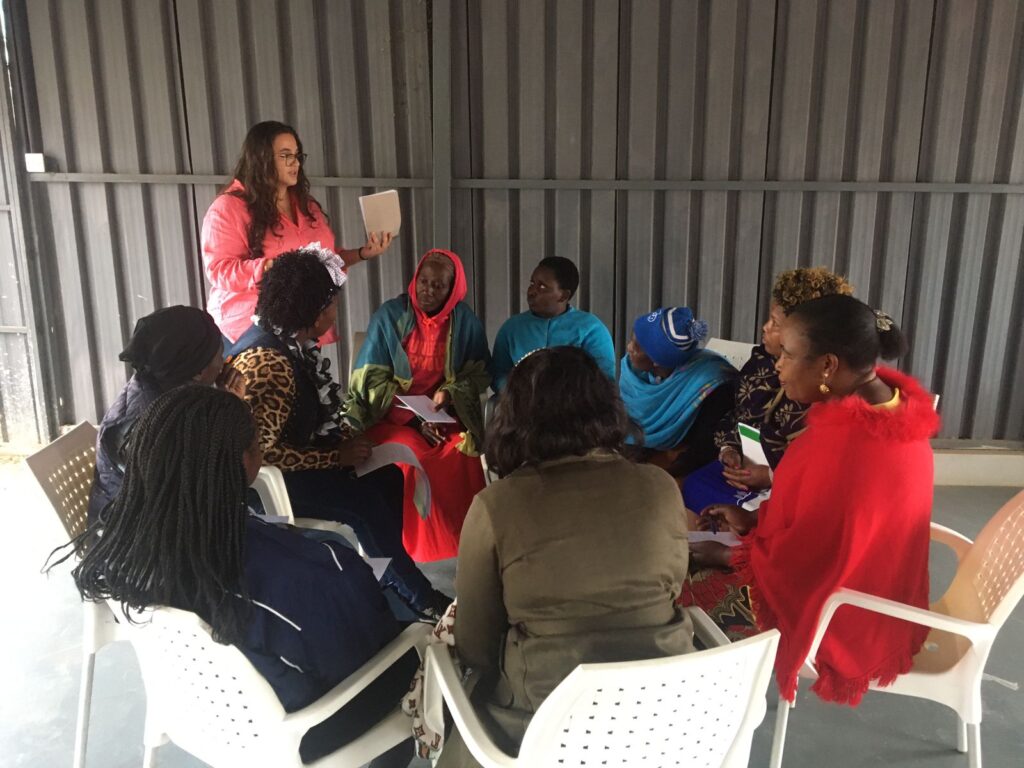
It infringes on the right to life, the right to liberty and security, the right not to be submitted to slavery, servitude, forced labour or bonded labour, and the right to freedom of movement, among others (https://www.un.org/en/universal-declaration-human-rights/). These rights are enshrined within numerous international human rights treaties, condemning human trafficking in all its forms.
According to the U.S. Department of State, Trafficking in Persons Report 2020, the government of Kenya reported identifying 853 victims of trafficking – 275 adult females, 351 girls, and 227 boys – a significant increase compared with about 400 identified victims in 2018. Most cases of human trafficking go unreported, so the real number of victims may be orders of magnitude larger. Most victims are unaccounted for in these figures (https://www.indcatholicnews.com/news/45158).
Trafficked women and girls encounter high rates of physical and sexual violence, including homicide and torture, psychological abuse, horrific work and living conditions, and extreme deprivation while in transit. Serious mental health problems result from trafficking, including anxiety, depression, self-injurious behaviour, suicidal ideation and suicide, drug and alcohol addiction, post-traumatic stress disorder (PTSD), dissociative disorders and complex PTSD (https://shalomconflictcenter.org/shalom-sccrrs-interventions-towards-healing-post-traumatic-stress-disorder-ptsd-among-victims-of-conflict-in-eastern-africa%ef%bf%bc/).
Human rights have a symbiotic relationship with conflict transformation, peacebuilding, and reducing violence against women and children. The protection of human rights, and thereby the prevention of human trafficking, plays a critical part in building sustainable, positive peace. Without adequate protection of the human person’s dignity and rights, peace cannot flourish. Respecting and promoting human dignity and rights is not only a moral imperative but also a practical approach to building and maintaining a peaceful society. The core principles of human rights, according to Dorfman (2010), “hold up the vision of a free, just, and peaceful world and set minimum standards for how individuals and institutions everywhere should treat people.”
Shalom-SCCRR works closely with community leaders (influential opinion shapers) in the urban informal settlements of Nairobi, training them with analytical skills in conflict analysis and transformation techniques (https://shalomconflictcenter.org/briefing-paper-no-1/). With this information, they can be peacebuilders in their community (https://shalomconflictcenter.org/eastern-africa-shalom-empowerment-center-sec-addressing-violence-against-women-and-children-concept-document/). Shalom-trained community members, among others, in human trafficking hot spots, such as the urban informal settlements, are best situated to participate in the work to combat this phenomenon. Using Shalom’s existing strategy, it can empower these community leaders with information about human trafficking, its prevalence in the community, strategies for prevention and attending to its violent reverberations. Raising awareness and reducing incidences of human and organ-trafficking is critical to conflict transformation and peacebuilding processes.
What is Human Trafficking?
Trafficking in persons is defined as the recruitment, transportation, transfer, harbouring or receipt of persons, by means of threat or use of force or other forms of coercion, of abduction, of fraud, of deception, of the abuse of power or a position of vulnerability or of the giving or receiving of payments or benefits to achieve the consent of a person having control over another person, for the purpose of exploitation, (see; https://www.unodc.org/documents/human-trafficking/Toolkit-files/08-58296_tool_1-1.pdf )Exploitation may include forced labour, slavery, prostitution, sexual exploitation, or similar practices, removal of organs.
Empowerment and Collaboration with Other Peace Practitioners and Organizations
Shalom works in cooperation with other significant actors at local, regional, and international levels. This is based on the understanding that partnerships are vital in furthering our interventions and the ripple effect for peace and development in other parts of the world. Shalom-SCCRR accredited by the United Nations (https://shalomconflictcenter.org/3901-2/), has partner relationships with numerous community and faith-based organizations of various traditions and beliefs.
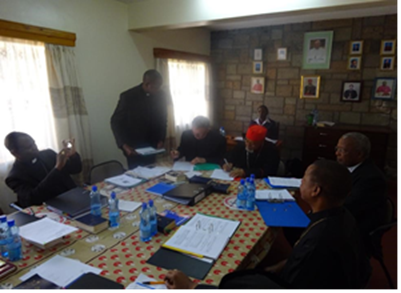
In addition to the Memorandum of Understandings (MoU) with IGAD, Shalom-SCCRR has signed other MOUs with AMECEA (Associated Membership of Episcopal Conferences of Eastern Africa); with the Senator George J. Mitchell Institute for Global Peace, Security and Justice at Queens University, Belfast, N. Ireland, and with the Edward M. Kennedy Institute for Conflict Intervention at the National University of Ireland in Maynooth.
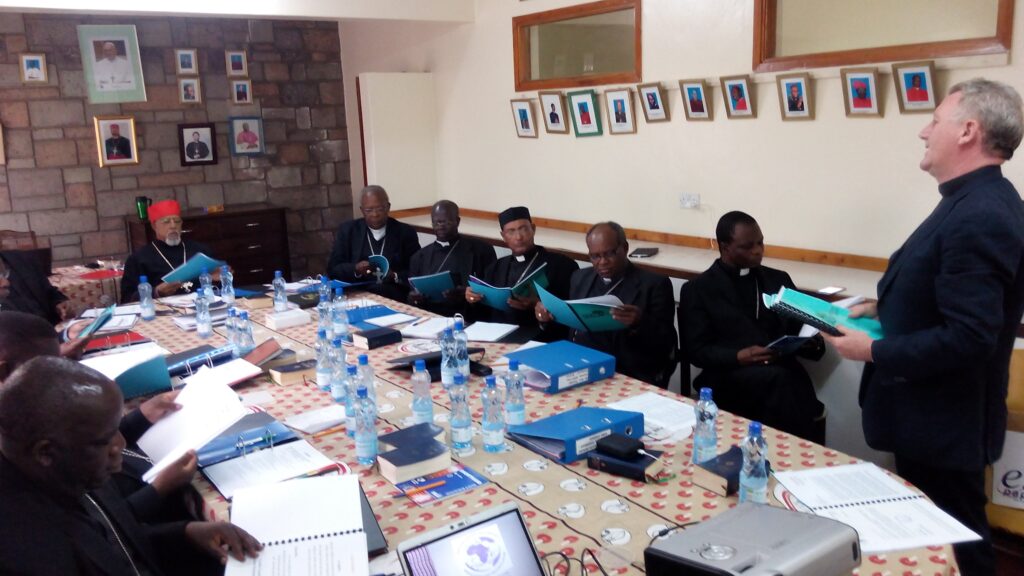
Shalom-SCCRR has been instrumental in the delivery of an academic course on Conflict Resolution and Reconciliation at Tangaza University in Nairobi under the tutorship of Fr Devine, PhD, and Fr Oliver Noonan, (PhD Candidate) Executive Director. The University has lately tapped further into the wealth of expertise and experience of Fr. Patrick through his appointment to the first governing Council of Tangaza University as its Vice Chairman.
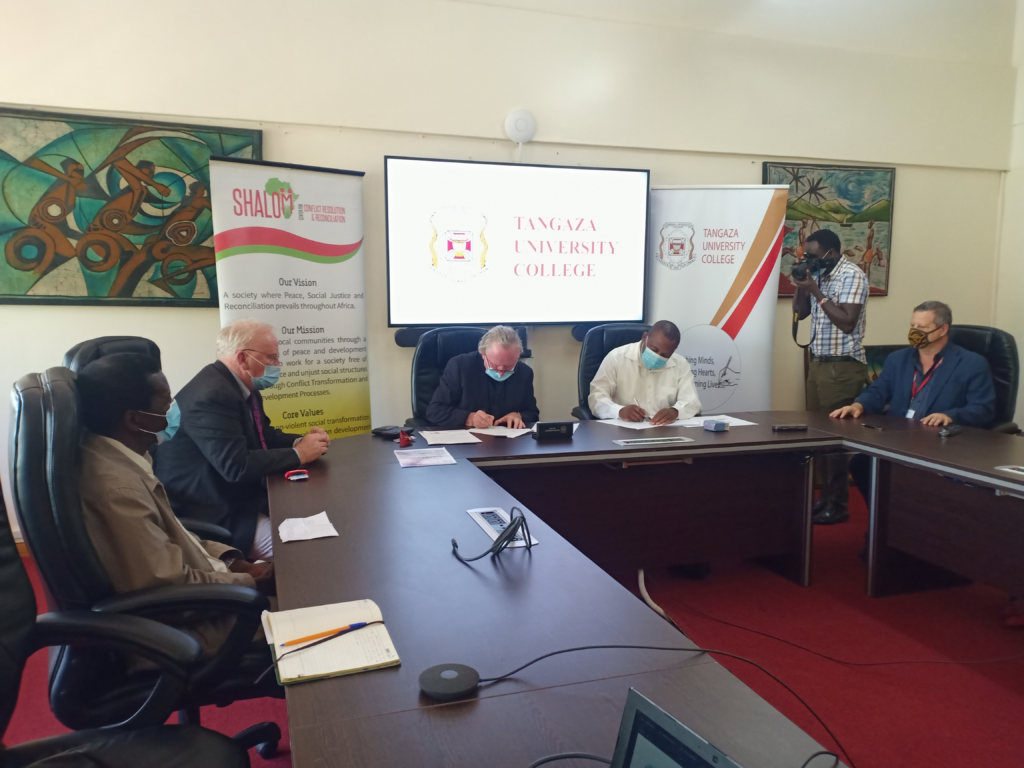
Shalom-SCCRR has further honored invitations at several universities in the USA and Ireland presenting lectures, talks, modules, and symposiums on issues relating to conflict resolution and reconciliation methodologies, religious ideological extremism, inter-ethnic conflict management, preventing violence against women and children, the environment and conflict, the humanitarian-peace-development nexus, and human trafficking. Through participation in lectures and symposiums locally and internationally, Shalom-SCCRR has broadened the base of those with the capacity to understand the underlying dimensions of violent conflict thus bringing more awareness on the skills that are required in guaranteeing sustainable resolution.
Julie L. Butler, an academic and freelance writer, reported in Jan 2024 (https://shalomconflictcenter.org/wpcontent/uploads/2024/01/Harvard_Kennedy_School_ArticleWITH_PHOTOS_MAP_1_17_24_FINAL.pdf; https://www.indcatholicnews.com/news/48874) on Rev. Dr. Patrick Devine being invited to the Harvard Kennedy School – School of Government – in the fall of 2023 to give another presentation concerning methodology, “about the success of Shalom-SCCRR’s unique approach to conflict resolution efforts in eastern Africa with Paula Soumaya Domit, a Harvard Master of Public Policy (MPP) and International Consultant for Shalom-SCCRR”. She continued, “recently, Shalom-SCCRR received the prestigious accreditation honor from the United Nations (UN) for ‘integrity & methodology’. This enables Shalom-SCCRR to,… further their conflict resolution and peacebuilding efforts, on a broader scale. Many international universities have benefited from modules and lectures taught by Rev. Dr. Devine on Shalom-SCCRR’s sustainable peacebuilding methods, some of which include Catholic University of Eastern Africa (CUEA), DePaul University (Chicago), Edward Kennedy Institute at the National University of Ireland (Maynooth), George Mitchell Institute at Queen’s University Belfast (Northern Ireland), Harvard John F. Kennedy School of Government, Harvard Law School, Harvard Negotiation and Mediation Clinical Program, Stellenbosch University (South Africa), University of San Diego, University of Texas (Austin), and more. In the future, he hopes to expand his teaching modules and engagements worldwide”.
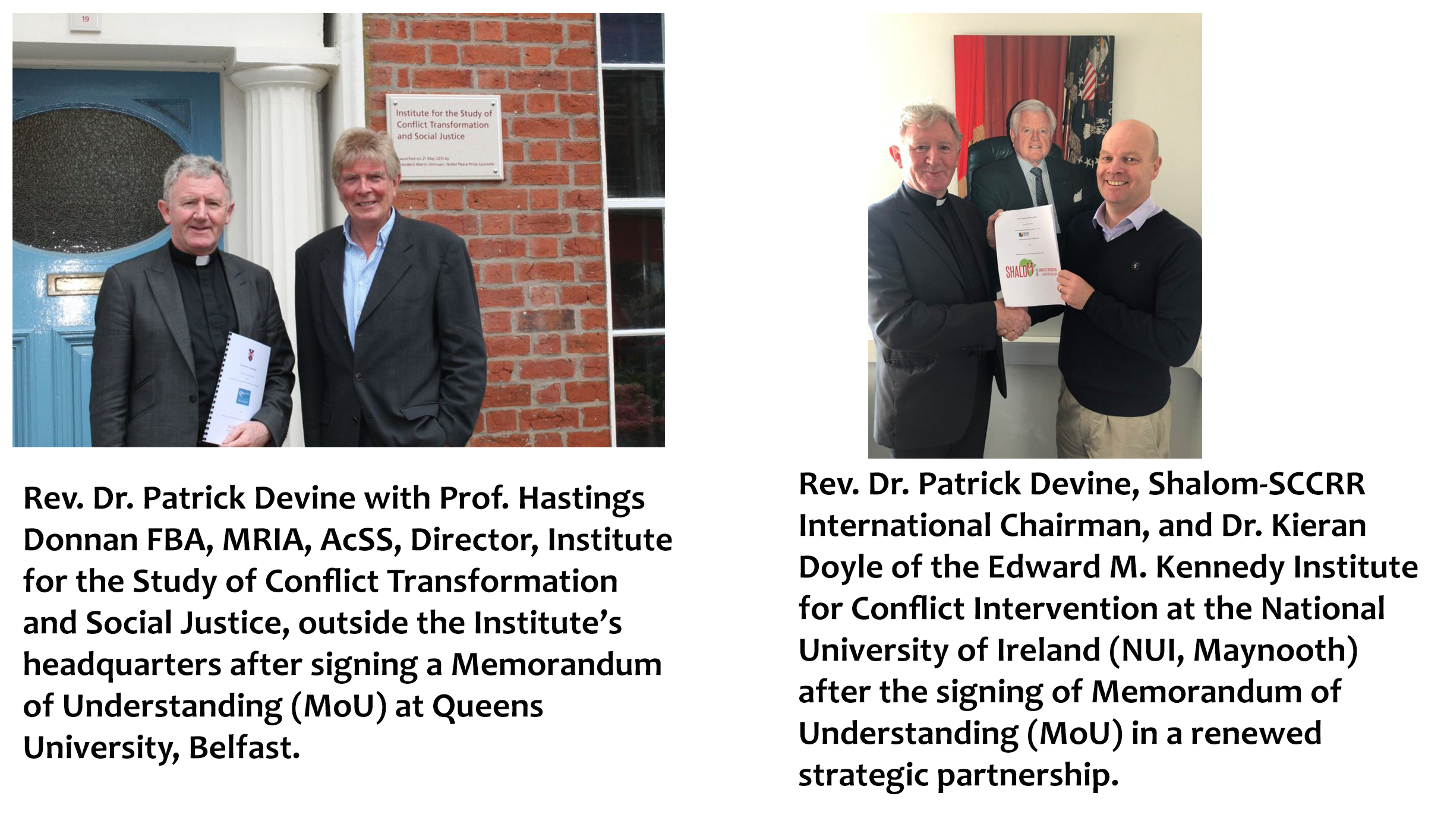
Conclusion
The continuing enthusiastic and voluntary participation of government, religious, and civic society associations in SHALOM-SCCRR conferences confirms the facts base and authenticity of the organization’s research-focused methodology and the benefits that these stakeholders draw from it. Furthermore, the continued stability of the conflict transformation and peace training programs, broadened the scope of advocacy on conflict issues, fostering of inter-ethnic school education, inter-religious Dia-Praxis initiatives, and the general development of educational infrastructure confirms the importance of research which has consistently over the years provided the base for SHALOM-SCCRR’s contribution.
Authors:
Rev. Oliver Noonan, MA (Ph.D. Candidate) – Shalom-SCCRR Executive Director
Mr. Godfrey Okoth, MA (Ph.D. Candidate) – Shalom-SCCRR Senior Project Officer
Ms. Esther Kibe, MA – Shalom-SCCRR Women’s Project Officer & Communications Department
Relevant Links
- Shalom- SCCRR. (2024). 2009-2023 Shalom-SCCRR Results and Achievements.https://shalomconflictcenter.org/2009-2023-shalom-sccrr-results-and-achievements/
- Shalom-SCCRR. (2018). IGAD Endorses Shalom- SCCRR for United Nations Accreditation. https://shalomconflictcenter.org/igad-endorses-shalom-sccrr-for-united-nations-accreditation/
- Shalom-SCCRR. (2024). Harvard Kennedy School; A Conversation with Rev. Dr. Patrick Devine, and Paula Soumaya Domit.https://shalomconflictcenter.org/havard-kennedy-school-conversation-with-rev-dr-patrick-devine-and-paula-soumaya-domit/
- Moran, M. (2020). Eastern Africa: Shalom-SCCRR receives United Nations (UN) Accreditation. https://shalomconflictcenter.org/3901-2/
- Devine, P. R. (2017). “Radicalization and Extremism in Eastern Africa; Dynamics and Drivers”, published in the Journal of Mediation and Applied Conflict Analysis, 4 (2).http://mural.maynoothuniversity.ie/9086/7/PD-Radicalisation-2017.pdf
- Shalom-SCCRR. (2017). EU Development Council – “We can’t have sustainable development without peace.”https://shalomconflictcenter.org/eu-development-council-we-cant-have-sustainable-development-without-peace/
- IGAD. (2015). IGAD Signs an Updated MoU with Shalom Center.https://igad.int/igad-signs-an-updated-mou-with-shalom-center/
- Shalom-SCCRR. (2015). Shalom Signs Memorandum of Understanding with IGAD.https://shalomconflictcenter.org/shalom-signs-memorandum-of-understanding-with-igad/
- Shalom-SCCRR. (2015). Update: Shalom Signs Comprehensive New IGAD Agreement.https://shalomconflictcenter.org/update-shalom-signs-updated-igad-agreement/
- Shalom-SCCRR. (2014). IGAD (Africa) Honours Fr. Patrick Devine and Pays Tribute to
the Work of SCCRR.https://shalomconflictcenter.org/igad-africa-honours-fr-patrick-devine-and-pays-tribute-tothe-work-of-sccrr/ - Shalom-SCCRR. (2015). Irish Ambassador to Kenya Meets With Shalom And IGAD Leadership.https://shalomconflictcenter.org/irish-ambassador-to-kenya-meets-with-shalom-and-igad-leadership/
- Shalom-SCCRR. (2014). Shalom-SCCRR Letter to IGAD 2014, Advocacy For Conflict Transformation in South Sudan.https://shalomconflictcenter.org/shalom-sccrr-letter-to-igad-2014-advocacy-for-conflict-transformation/
- Shalom-SCCRR. (2012). SCCRR Endorsement by IGAD.https://shalomconflictcenter.org/sccrr-endosement-by-igad/
- Conflict Between Pastoral Communities in Eastern Africa -SCCRR Research Findings on the Turkana/Samburu Conflict, Tangaza Collage, March 31, 2012. https://shalomconflictcenter.org/wp-content/uploads/2021/10/CONFLICT-BETWEEN-PASTORAL-COMMUNITIES-IN-EASTERN-AFRICA-SCCRR-RESEARCH-FINDINGS-ON-THE-TURKANASAMBURU-CONFLICT-TANGAZA-COLLAGE-MARCH-312012.pdf

